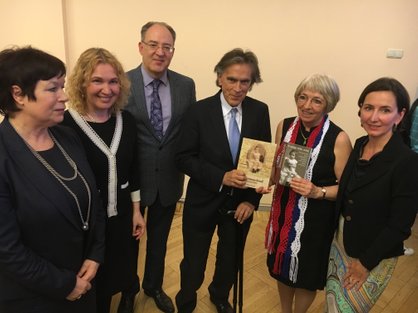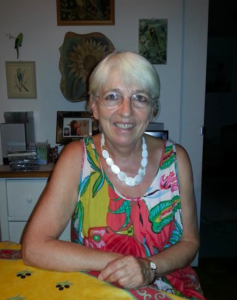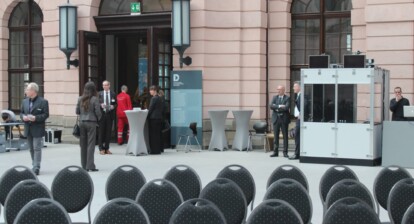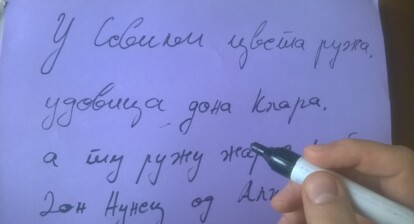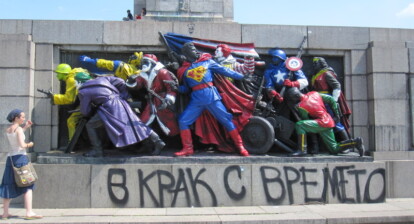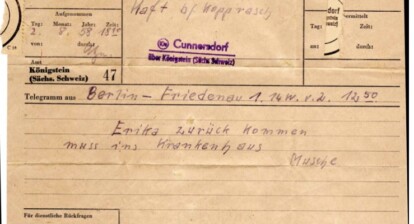The collapse of the Soviet Union and the fall of the Iron Curtain not only had immense political implications for Europe, but for many also on a personal level. For Eleonore Dupuis it meant to eventually get the chance to search for her father, a former Soviet soldier in occupied Austria.
“I was always proud to have a Russian father“, Eleonore told me when I met her in her flat in Vienna. Born in 1946 in the Austrian city of St.Pölten, Eleonore Dupuis had a normal childhood until 1955. In that year the last occupying forces left Austria and her mother revealed to her that her father was a Soviet soldier. “My mother told me that his name was Michail and that he was from the city of Tver. She could not exactly remember his surname, but something like Groman or Grossman.”
“My Silent Heroine”
Growing up as a child with a Soviet military father was very much connected with social exclusion. Those children were treated as “enemy’s children”, as “bastards”, some, however, but also as beloved children. It depends on how the direct surroundings coped with this phenomenon. Eleonore Dupuis was never the victim of any discrimination or bullying and never felt different in any way. That is why she refuses to be called “occupation-child” and prefers the term “liberation-child”. “I think the main reason for that was my mother. She was always friendly towards our neighbours and treated them with the utmost respect. In return they supported us and did not let us feel the stigma of me being an occupation-child.”
The Search Begins…
Eleonore got married in Australia, lived in Argentina and France with her three children, she had a fulfilled and busy live. But eventually, 40 years after she got to know the truth about her father, Eleonore began with the search. “I started immediately to study Russian in order to be able to talk to him”. In 2002 Eleonore came in contact with the Russian broadcast “Ždi Menja” (transl. “Wait for me”), which aim it is to search publicly for missing people in almost every country of the former Soviet Union. This broadcast soon became a very important platform for Austrian occupation children in order to find their father’s family in the former Soviet Union.
However, no serious traces were discovered until a Russian woman, Valentina, contacted her. She stated that she had seen the photo of Eleonore’s mother in her father’s stuff ten years ago and hence she believed that Eleonore might be her half-sister. Although Eleonore had been rather skeptical about this trace, she nevertheless decided to visit Valentina in Russia to perform a DNA-test. “When I arrived in Valentina’s home town and got off the train a crowd of people including Russian TV reporters were waiting to welcome me and made a reportage on the ‘Austrian women with a French family finding her way to Russia to drink Soviet champagne.’ (Click here to see the TV-coverage from 9:18 min.). I guess I am somehow as well a child of globalization, which already began after the Second World War.” Eventually the DNA-test turned out to be negative but both still feel very connected to each other and communicate on a regularly basis.
Building Bridges
Eleonore Dupuis still has not ascertained who her father is. However, over the years she has broadened her horizon tremendously through the searching process and hence regards it as a success. Almost every year she travels to Russia in order to visit beloved friends and to discover new aspects of the Russian culture, which she admires so greatly. When I asked her about today’s relation between Europe and Russia, she just waived her hand in the air as if it didn’t matter. “That is just politics. Since I have been travelling to Russia I see myself as bridge-builder between Austria and Russia. I always tell my Austrian friends and families about how warmly I was welcomed and how unbelievable polite and helpful the Russians are.”
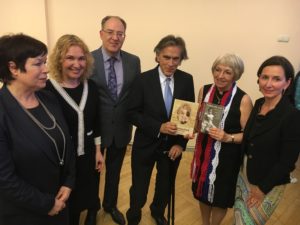
Eleonore Dupuis presenting her book in Moscow. Photo: Courtesy of Eleonore Dupuis.
In 2016 Eleonore’s book “Liberation Child” about her ongoing search was translated into Russian. “I had the honour to present it at the Russian State University for the Humanites. I had never expected such a great interest for the destiny of an occupation-child.” In the last years more and more occupation children go public with their stories. Since they have been meeting each other on a regularly basis, they experience a sort of a self-empowerment process and develop a sense of belonging. In addition, Eleonore is still full of hope, as many “occupation-grandchildren” are more and more interested in ascertaining who their grandfather is.
“It is very delighting to know that once we – the occupation children – are gone that there are still some left who will continue to search. I am convinced that it is immensely important to know his own roots.”

